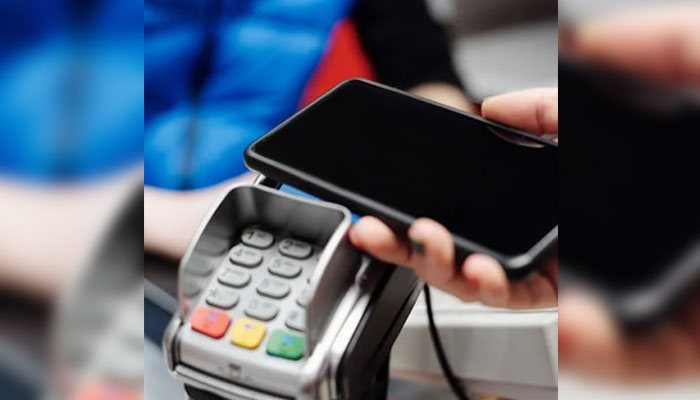Digital transactions make up 83pc of 844m retail payments done by banks, EMIs
KARACHI: Digital transactions’ share in retail payments by banks and regulated non-banking entities has been consistently rising in Pakistan, as technological advancements introduce innovative payment methods, the State Bank of Pakistan said on Friday.
During the third quarter (January-March) of the fiscal year 2023-24, digital transactions (including ATM cash withdrawals) accounted for 83 per cent of the 844 million total retail payments processed by banks and electronic money institutions (EMIs), while the remaining 17 per cent were over-the-counter (OTC) transactions at banks’ branches, according to the quarterly payment systems report, issued by the SBP.
The growth in digital transactions is largely attributable to fund transfers, bill payments, payments for goods and services, and mobile top-ups.“Moreover, customers are more reliant on ATMs, compared with bank branches for cash withdrawals for their daily needs,” the report said.
“It is also notable that the network of 18,655 ATMs across the country maintained an average uptime of 96.5 per cent during the quarter,” it added.Digital wallets and instant payments remain key drivers of digital transactions. Mobile banking transactions continue to be the most preferred option with a share of 43 per cent in digital transactions during the quarter, reaching 301 million, amounting to Rs12,955 billion, according to the report.
Internet banking transactions grew by 3.0 per cent, reaching 59 million, amounting to Rs6,467 billion. In-store purchases through point-of-sale (POS) machines also grew, with volume increasing by 8.0 per cent to 71 million and value by 6.0 per cent to Rs394 billion.
E-commerce (only card-not-present) transactions however posted a decline of 13 per cent in volume, reaching 10 million but increased by 3.0 per cent in value reaching Rs52 billion. A majority of POS merchants are retail outlet stores, clothing and apparel outlets, restaurants, and fuel stations whereas clothing and apparel online stores are the most common type of e-commerce merchants, it said.
Raast, Pakistan’s instant payment system processed 140 million transactions totalling Rs3,437 billion in the third quarter of FY24, marking a 31 per cent increase in volume and a 48 per cent increase in value from the previous quarter.
This significant growth underscores Raast’s crucial role in the nation’s payment landscape. Furthermore, 1.5 million transactions amounting to Rs315,596 billion were settled through PRISM (RTGS), including settlement of government securities, funds transfers, and ancillary clearing transactions.
The national payment system plays an important role in supporting the economic activities of a country by enabling secure and efficient financial transactions.“Despite high currency in circulation in the Pakistani economy, we observe that technological advancements are introducing innovative payment methods, allowing existing and new payment service providers to leverage the prevailing/established payment infrastructures,” the report said.
“Most importantly, consumers and businesses are increasingly embracing digital payment methods, thus contributing to a shift towards a more digital payments ecosystem in the country.”
-
 Winter Olympics 2026: Top Contenders Poised To Win Gold In Women’s Figure Skating
Winter Olympics 2026: Top Contenders Poised To Win Gold In Women’s Figure Skating -
 Inside The Moment King Charles Put Prince William In His Place For Speaking Against Andrew
Inside The Moment King Charles Put Prince William In His Place For Speaking Against Andrew -
 Will AI Take Your Job After Graduation? Here’s What Research Really Says
Will AI Take Your Job After Graduation? Here’s What Research Really Says -
 California Cop Accused Of Using Bogus 911 Calls To Reach Ex-partner
California Cop Accused Of Using Bogus 911 Calls To Reach Ex-partner -
 AI Film School Trains Hollywood's Next Generation Of Filmmakers
AI Film School Trains Hollywood's Next Generation Of Filmmakers -
 Royal Expert Claims Meghan Markle Is 'running Out Of Friends'
Royal Expert Claims Meghan Markle Is 'running Out Of Friends' -
 Bruno Mars' Valentine's Day Surprise Labelled 'classy Promo Move'
Bruno Mars' Valentine's Day Surprise Labelled 'classy Promo Move' -
 Ed Sheeran Shares His Trick Of Turning Bad Memories Into Happy Ones
Ed Sheeran Shares His Trick Of Turning Bad Memories Into Happy Ones -
 Teyana Taylor Reflects On Her Friendship With Julia Roberts
Teyana Taylor Reflects On Her Friendship With Julia Roberts -
 Bright Green Comet C/2024 E1 Nears Closest Approach Before Leaving Solar System
Bright Green Comet C/2024 E1 Nears Closest Approach Before Leaving Solar System -
 Meghan Markle Warns Prince Harry As Royal Family Lands In 'biggest Crises' Since Death Of Princess Diana
Meghan Markle Warns Prince Harry As Royal Family Lands In 'biggest Crises' Since Death Of Princess Diana -
 Elon Musk Weighs Parenthood Against AI Boom, Sparking Public Debate
Elon Musk Weighs Parenthood Against AI Boom, Sparking Public Debate -
 'Elderly' Nanny Arrested By ICE Outside Employer's Home, Freed After Judge's Order
'Elderly' Nanny Arrested By ICE Outside Employer's Home, Freed After Judge's Order -
 Keke Palmer On Managing Growing Career With 2-year-old Son: 'It's A Lot'
Keke Palmer On Managing Growing Career With 2-year-old Son: 'It's A Lot' -
 Key Details From Germany's Multimillion-euro Heist Revealed
Key Details From Germany's Multimillion-euro Heist Revealed -
 David E. Kelley Breaks Vow To Cast Wife Michelle Pfeiffer In 'Margo's Got Money Troubles'
David E. Kelley Breaks Vow To Cast Wife Michelle Pfeiffer In 'Margo's Got Money Troubles'




